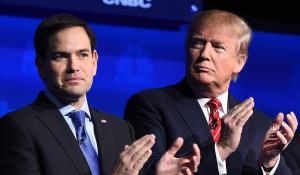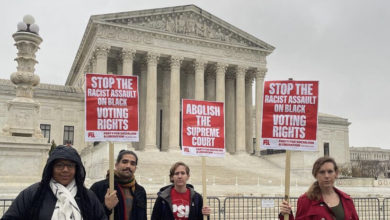 To many, the Republican primaries and debates may seem more like dark fantasies than reality. Reality TV star and big real estate capitalist, Donald Trump is now the undisputed front-runner and presumptive nominee for the Republican Party. While presented in a way almost completely lacking substance, the debates have exposed his near-total lack of knowledge on foreign policy. He is openly drawing the support of fascists, white supremacists and other militant reactionaries, as David Duke’s endorsement and the Ku Klux Klan rallies publicly supporting him show.
To many, the Republican primaries and debates may seem more like dark fantasies than reality. Reality TV star and big real estate capitalist, Donald Trump is now the undisputed front-runner and presumptive nominee for the Republican Party. While presented in a way almost completely lacking substance, the debates have exposed his near-total lack of knowledge on foreign policy. He is openly drawing the support of fascists, white supremacists and other militant reactionaries, as David Duke’s endorsement and the Ku Klux Klan rallies publicly supporting him show.
This is only the setting, however, for the circus that has begun in the media—especially in the Republican debates. As if the substance of the Trump campaign’s substance were not enough of a combination of menace and farce, the Republican establishment’s candidate of choice, Marco Rubio, has spectacularly failed to seriously challenge Trump. He has gone after Trump’s lack of policy knowledge, his inability to actually articulate a coherent platform and other serious weaknesses, but only with bluster, clumsiness and embarrassing ineffectiveness. His most well-remembered commentary from the most recent round of clashes with Trump has nothing to do with Trump’s positions or even his presentation. Rather, Rubio initiated a puerile attack on Trump’s penis!
Though the elections can be disorienting, even mesmerizing, this should shock anyone: outspoken, militant racist Donald Trump is the frontrunner by many lengths, and the Republican Party establishment is in a panic, throwing all of its weight behind an uncharismatic political newcomer whose line of attack includes ad-hominem attacks that would be considered weak and immature by most high school students.
What’s behind the circus? Why is Donald Trump winning, and why is the Republican establishment incapable of mobilizing a serious alternative?
Since the end of the Bush years, the Republican Party has been mired in a deep crisis. Endless wars and deep economic malaise splintered the base. Compounding the issue was the party’s failure to reorient its base to adapt to new political circumstances, especially given the public’s increasing intolerance for racism. Ronald Reagan and other far-right politicians had essentially built up the Republican Party featuring racism as a key element of its platform. Through dog-whistle remarks about “welfare queens” and “big government,” Reagan and company scapegoated Black America while systematically destroying social welfare, affirmative action and other programs meant to defend the oppressed and exploited. The “compassionate conservative” movement in the early 2000s was part of an effort by some in the Republican Party to move away from its dependence on overt racism as an integral part of the platform.
This combination of factors culminated in the Tea Party movement, which was made up of a coalition of ideologically-driven big capitalists such as the Koch brothers and John Schnatter and a mass base of disaffected Republicans primarily from privileged segments of the working class and small capitalists. Notably, the two politicians in serious contention with Trump in the Republican race—Rubio and Cruz—both rode Tea Party momentum to power.
Donald Trump, on the other hand, has essentially tailor-fit his positions to capture the same dissatisfaction among the Republican base, with an extra dose of anti-establishment rhetoric and outspoken, militant racism.
Trump’s success therefore highlights two important factors in American politics today: the deep economic crisis in the United States on the one hand and the stunning disconnect between Republican elites and political realities on the other. This combination of factors makes up the foundation for Trump’s resonance with some sectors of the middle and white working classes. Its development also exacerbates the old elites’ control over the Republican Party, as the rank-and-file actively spurn chastising criticisms from Mitt Romney and others.
Marco Rubio’s spectacular failure in last weekend’s primaries stems out of these developments; these are the reasons for his inability to gain traction, along with his increasingly-desperate presentation as he flounders. It also stems from a hypocritical and short-sighted approach by Republican elites emphasizing control, rather than principle. Despite Mitt Romney’s recent criticisms of Trump, for example, he gladly accepted his endorsement in 2012.
Taken together, these are complex and potentially very dangerous circumstances for poor, working and oppressed people. A newly-galvanized white supremacist movement has latched onto Trump’s political momentum without any serious criticism from the candidate, and criticism of Trump’s bare-faced bigotry is coming too late from the big media. Though a Trump nomination and even presidency would not necessarily signal decisive victories for fascism as did, for example, the Nazis’ electoral victory in 1933, it does represent a major revival for white supremacism and other fascist tendencies. In particular, a decisive victory for fascism would require a mass fascist movement which does not yet exist.
It is consequently the urgent task of progressives and revolutionaries to blunt the attacks and deceptions coming from the Trump campaign. Exposing Trump as a vain, bigoted billionaire with little in common with working people is an essential part of preventing the development of a mass fascist movement, as well as building an independent anti-fascist and pro-people movement.





